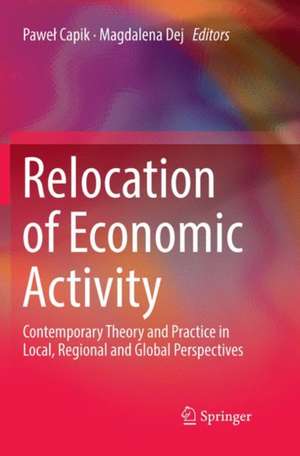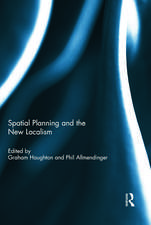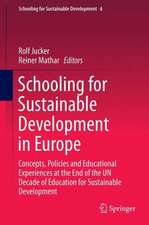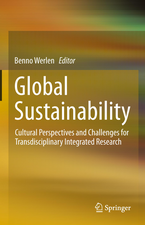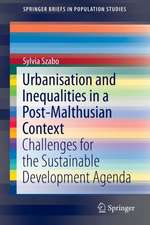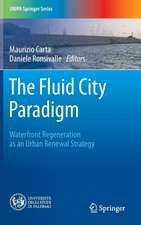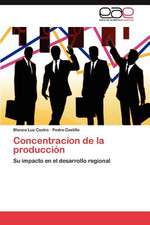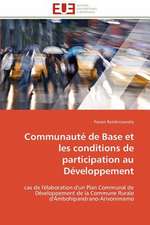Relocation of Economic Activity: Contemporary Theory and Practice in Local, Regional and Global Perspectives
Editat de Paweł Capik, Magdalena Dejen Limba Engleză Paperback – 20 dec 2018
This book will be appreciated by diverse audiences. Geography and regional science researchers of ‘economic activity location’ can engage with the critical appraisal of key theoretical concepts and an analysis of recent empirical data. Students of human and economic geography, planning, regional development, and global supply chain management in senior years of undergraduate programmes and completing postgraduate degrees will appreciate the accessible language, multiple examples and graphical illustrations of theoretical frameworks underpinning location and relocation of firms and industries, and its consequences. Practitioners, including local and regional policy makers and location consultants will enjoy the comparative discussion of solutions and practices adopted in localities, regions and countries as diverse as China, Brazil, The Netherlands and Poland.
| Toate formatele și edițiile | Preț | Express |
|---|---|---|
| Paperback (1) | 358.16 lei 38-45 zile | |
| Springer International Publishing – 20 dec 2018 | 358.16 lei 38-45 zile | |
| Hardback (1) | 390.63 lei 3-5 săpt. | |
| Springer International Publishing – 18 sep 2018 | 390.63 lei 3-5 săpt. |
Preț: 358.16 lei
Nou
Puncte Express: 537
Preț estimativ în valută:
68.53€ • 71.55$ • 56.72£
68.53€ • 71.55$ • 56.72£
Carte tipărită la comandă
Livrare economică 31 martie-07 aprilie
Preluare comenzi: 021 569.72.76
Specificații
ISBN-13: 9783030063986
ISBN-10: 3030063984
Pagini: 189
Ilustrații: XIV, 189 p. 17 illus., 16 illus. in color.
Dimensiuni: 155 x 235 mm
Ediția:Softcover reprint of the original 1st ed. 2019
Editura: Springer International Publishing
Colecția Springer
Locul publicării:Cham, Switzerland
ISBN-10: 3030063984
Pagini: 189
Ilustrații: XIV, 189 p. 17 illus., 16 illus. in color.
Dimensiuni: 155 x 235 mm
Ediția:Softcover reprint of the original 1st ed. 2019
Editura: Springer International Publishing
Colecția Springer
Locul publicării:Cham, Switzerland
Cuprins
Chapter 1. Introduction (Dej).- Part I. Industries in Global Space.- Chapter 2. Between Location, Persistence and Relocation – Historical and Spatial Trajectories of Polish Aviation Industry (Suwala).- Chapter 3. Relocation of Automotive Industry in Brazil and Mexico: Between Corporate Strategies and Local Polices (Wójtowicz).- Chapter 4. Changing Dynamics in the Cross-Border Production Networks of Transnational Corporations: Relocation of Hong Kong and Taiwanese Manufacturing in Mainland China (Yang).- Part II: Firm Relocation Factors.- Chapter 5. Relocation of Economic Activity within Metropolitan Areas in Poland - Scale and Drivers (Dej).- Identifying Factors Driving Firm Location and Relocation: The Case of Ticino (Rossi).- Chapter 6. How Does the Current Economic Crisis Affect Firm Relocation? A Comparative Analysis of Pre- and Post-crisis Firm Movements from Greece to Bulgaria (Kapitsinis).- Chapter 7. Labour Cost Structure as a Factor in Industrial Production Relocation within the European Union (Wiedermann).- Part III: Impacts and Consequences.- Chapter 8. Relocation of Firms: Quantitative and Qualitative Consequences for the Labour Market (Małuszyńska).- Chapter 9. Firm Mobility: Residential Migration in Disguise (Koster).- Chapter 10. Relocation of Economic Activities and Creation of Spatial Conflicts in a Metropolitan Region: The Case of Łódź (Dmochowska-Dudek).- Chapter 11. The Location of Industry as a Way to Achieve Balanced Development: Example of Middle Povardarie in The Republic Of Macedonia (Toshevska).- Chapter 12. Conclusions: Relocation Factors and Consequences - Towards a Multidisciplinary Research Agenda (Capik).
Notă biografică
Dr Pawel Capik lectures in international business at Keele University (UK). His research explores interdependencies between international business strategies and operations and regional development theory and practice, particularly in the context of emerging and transition economies. Paweł’s research areas include inward investment attraction and place marketing, sourcing and shoring strategies, large and small firms' internationalization and location motivations and their impacts on regional and local economies.
Dr Magdalena Dej is a geography researcher at the National Institute for Spatial Policy and Housing (Poland). She received her PhD from Jagiellonian Univeristy and specializes in economic local and regional development, particularly the development of rural areas. She authored and coauthored several books, numerous reports and research papers on the impacts of large companies on local communities as well as on rural areas and their relationship with major metropolitan areas and labor markets. Magdalena led and participated in several international research projects financed by the European Union Interreg IVC, International Visegrad Fund, Polish-German Foundation for Science and National Science Centre, Polish Ministry of Science and Higher Education.
Dr Magdalena Dej is a geography researcher at the National Institute for Spatial Policy and Housing (Poland). She received her PhD from Jagiellonian Univeristy and specializes in economic local and regional development, particularly the development of rural areas. She authored and coauthored several books, numerous reports and research papers on the impacts of large companies on local communities as well as on rural areas and their relationship with major metropolitan areas and labor markets. Magdalena led and participated in several international research projects financed by the European Union Interreg IVC, International Visegrad Fund, Polish-German Foundation for Science and National Science Centre, Polish Ministry of Science and Higher Education.
Textul de pe ultima copertă
This timely volume provides a thorough analysis of current trends in location and relocation of economic activity globally, regionally and locally. Using robust empirical material this book offers a multidisciplinary, comprehensive overview, critique and extension of long-established theories underpinning patterns of firm (re)location. It explores dominant trends in the mobility and relocation of industries and firms, examines the factors guiding such trends and evaluates their consequences in both developed and emerging economies in Europe, Asia and Latin America.
This book will be appreciated by diverse audiences. Geography and regional science researchers of ‘economic activity location’ can engage with the critical appraisal of key theoretical concepts and an analysis of recent empirical data. Students of human and economic geography, planning, regional development, and global supply chain management in senior years of undergraduate programmes and completing postgraduate degrees will appreciate the accessible language, multiple examples and graphical illustrations of theoretical frameworks underpinning location and relocation of firms and industries, and its consequences. Practitioners, including local and regional policy makers and location consultants will enjoy the comparative discussion of solutions and practices adopted in localities, regions and countries as diverse as China, Brazil, The Netherlands and Poland.
This book will be appreciated by diverse audiences. Geography and regional science researchers of ‘economic activity location’ can engage with the critical appraisal of key theoretical concepts and an analysis of recent empirical data. Students of human and economic geography, planning, regional development, and global supply chain management in senior years of undergraduate programmes and completing postgraduate degrees will appreciate the accessible language, multiple examples and graphical illustrations of theoretical frameworks underpinning location and relocation of firms and industries, and its consequences. Practitioners, including local and regional policy makers and location consultants will enjoy the comparative discussion of solutions and practices adopted in localities, regions and countries as diverse as China, Brazil, The Netherlands and Poland.
Caracteristici
Provides a thorough analysis of current trends in location and relocation of economic activity globally, regionally and locally Delivers a multidisciplinary, comprehensive overview, critique and extension of long-established theories underpinning patterns of firm (re)location Demonstrates a diverse geographical scale of analysis and wide-ranging global coverage including developed and emerging economies in Europe, Asia and Latin America
